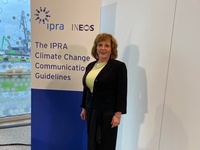ITL #516 Climate change: can public relations help save the world?
2 years, 9 months ago
IPRA’s Climate Change Communications Guidelines equip PR professionals to better navigate all communications efforts related to climate change issues. By Svetlana Stavreva.
If you are located in Europe, chances are that in January or February you were more likely to have gone water skiing than snow skiing this ‘winter.’ High temperatures have occurred lately. And Europe is not alone.
According to results recently released by the Copernicus Climate Change Service, globally, 2022 was the world’s fifth-warmest year on record. For the eighth year in a row, temperatures were more than 1 degree Celsius above the pre-industrial (1850-1900) level. According to the report, "The regions that saw the warmest year on record include large parts of western Europe, the Middle East, Central Asia and China, South Korea, New Zealand, north-western Africa and the Horn of Africa."
Everyone—the ones who admit global warming is an issue and the others who believe it is not yet a serious threat—suffered from fires, floods, tornados and other extreme weather around the world. I am convinced we have reached the point of no return, where we need to act. From a communications standpoint, the question is:
How can the PR and communications industries help?
More and more public relations (PR) professionals believe there is a need as well as a mandate for the PR and communications industry to act and to act now. For example, a survey among PR and communications professionals found that PR professionals overwhelmingly (almost 90%) believe that the PR profession has a responsibility to tackle climate change, with the majority of respondents (81%) expecting climate change to become a key issue for us—professionally, but I would also add, personally—over the next two years. There are many aspects of the topic—sustainability, the circular economy, waste management, the 1.5 degree Celsius challenge, air pollution, greenwashing, net-zero goals for carbon emissions, to name just a few—and PR professionals indicated that engaging with clients on climate action is a key responsibility. Last, but not least, two out of three (77%) respondents believe that the PR profession can make a difference.
These results are a call to action to the communications profession. Let me explain why. Some of you may recall that, for decades, the Earth's ozone layer has been threatened by halons and chlorofluorocarbons—chemicals previously used in refrigerators and aerosol sprays, among other sources. This was first discovered by detecting a hole in the ozone layer over Antarctica back in 1985.
In 1987—just two years later—the Montreal Protocol was adopted; it was enforced in 1989. Almost 200 countries agreed to phase out "ozone-depleting substances." There was a global understanding and support for this effort, and now scientists expect the ozone layer will completely recover to its normal appearance, perhaps by 2060. In fact, since 2000, parts of it have recovered at a rate of 1%-3%.
Global warming and climate issues require bigger and more complex effort; hence, the skills of communications professionals are in high demand, and the role of PR could be defining for the success of the global effort.
How do we begin?
"Being the change you wish to see in the world”—a quote often attributed to Mahatma Gandhi—could be a good start.
As a representative of the PR and communications industry, I feel very proud that I took part in work that resulted in launching (on 13 January 2023) the first Climate Change Communications Guidelines for a global PR association. I see this institutional effort as instrumental in further enabling a more structured communications approach to climate change issues, equipping PR professionals to better navigate all communications efforts related to climate change issues.
The guidelines interpret seven of the 18 articles of the ethical code of conduct for PR practitioners in relation to climate change communication. They urge practitioners to prevent greenwashing and communicate the science of climate change in a way that is understandable to the public. In addition, PR and communications professionals can really help in tackling climate illiteracy by driving education that can reach anyone.
At a corporate level, a good trend has been set by many corporations. More and more organizations have now started to impose guidelines around how they officially talk about climate change to make sure their language is relevant and fact-based. In addition, I've seen more and more forward-looking companies setting their own goals and ways to achieve net-zero carbon emissions in the near future. This is very important for gaining more supporters for the global cause of fighting global warming and climate change.
At a personal level, everyone should begin (if they have not already done so) with small and personal but still-significant steps to achieve carbon neutrality. There are numerous resources to help you do that. One of them is to check your own carbon footprint. One of the ways to calculate your footprint is to use one of the numerous and publicly available carbon footprint calculators. Then the steps to reduce and properly manage your emissions are clearer. Anyone who reduces greenhouse gas emissions makes an important commitment to climate protection.

The Author
Svetlana Stavreva
Svetlana Stavreva, IPRA Board Member and former IPRA President (2019-20).
mail the authorvisit the author's website
Forward, Post, Comment | #IpraITL
We are keen for our IPRA Thought Leadership essays to stimulate debate. With that objective in mind, we encourage readers to participate in and facilitate discussion. Please forward essay links to your industry contacts, post them to blogs, websites and social networking sites and above all give us your feedback via forums such as IPRA’s LinkedIn group. A new ITL essay is published on the IPRA website every week. Prospective ITL essay contributors should send a short synopsis to IPRA head of editorial content Rob Gray emailShare on Twitter Share on Facebook

